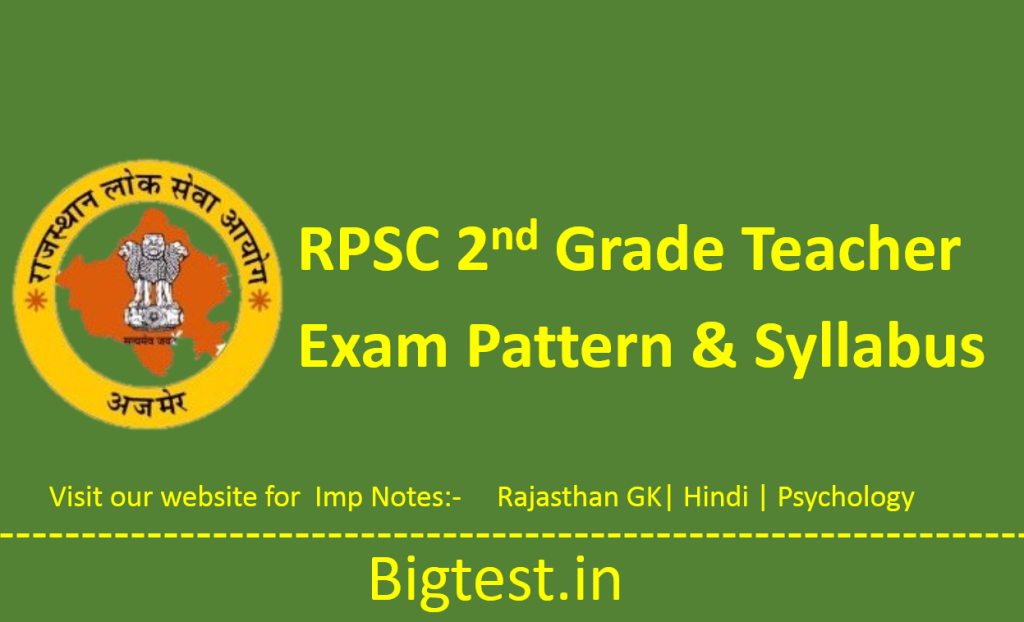- RPSC 2nd Grade Teacher 2022 Overview
- RPSC 2nd Grade Teacher Exam Detail 2022
- RPSC 2nd Grade Teacher 1st Paper Exam Pattern 2022
- RPSC 2nd Grade Teacher 2nd Paper Exam Pattern 2022
- RPSC Social Science 2nd Grade Teacher 1st Paper Syllabus 2022
- RPSC Social Science 2nd Grade Teacher 2nd Paper Syllabus 2022
RPSC Social Science 2nd Grade Teacher 1st Paper Syllabus 2022 – Click the link
RPSC Social Science 2nd Grade Teacher 2nd Paper Syllabus 2022
RPSC Social Science 2nd Grade Teacher की परीक्षा (2nd Paper) देने वाले परिक्षार्थियों के लिए परीक्षा पाठ्यक्रम यँहा दिया हुआ है | प्रश्न पत्र में सभी प्रश्न बहुविकल्पीय (Objective type) प्रकार के होंगे व सभी प्रश्नों के अंक समान होंगे । प्रत्येक गलत उत्तर के लिये 1/3 भाग ऋणात्मक अंकन (Negative Marking) किया जायेगा, और 2nd Grade Teacher का 2nd पेपर 300 नंबर का होगा । इस पेपर के अंदर 150 प्रश्न पूछे जाएंगे | प्रत्येक एक प्रश्न 2 अंक का होगा, और समय 2 घंटे 30 मिनट (150 मिनट) का होगा | और परीक्षा में न्यूनतम उत्तीर्णाक 40 प्रतिशत निर्धारित हैं । इस परीक्षा में 2nd पेपर के लिए अलग अलग सब्जेक्ट के अनुसार सिलेबस भी अलग अलग ही होगा | यँहा पर सामाजिक विज्ञान पाठ्यक्रम से संबंधित प्रश्न पूछे जाएंगे | सामाजिक विज्ञान का सिलेबस निम्न प्रकार है:-
HISTORY:-
- Indus Valley Civilization – Town Planning, Social, Religious and Economic Life.
- Vedic Age – Social and Religious Life.
- Buddhism and Jainism – Causes of Rising and Teachings.
- Mauryas: Source, Political and Administrative features.
- Post Mauryan Art.
- Guptas: Political Achievements of Rulers; Growth of Art, Literature & Sciences.
- Bhakti and Sufi Movements.
- Mughal Period – (1526-1707) – (i) Key features of Administration, (ii) Art & Architecture.
- Shivaji: Political and Administrative Achievements.
- National Movement in 19th and 20th Century –
- Revolution of 1857: Causes, Nature, and Main Events.
- Indian National Congress – Early Phase (Moderates and Extremists).
- Mass Movements of Gandhiji: Non-Cooperation, Civil Disobedience and Quit India Movement.
- Revolutionary Movements in 20th Century India –
(a) First Phase: 1905-1914
(b) Second Phase:(1924 to 1930)
(c) INA and Subhash Chandra Bose.
11. Political Revolutions in Modern World- American War of Independence, French Revolution and Russian Revolution.
GEOGRAPHY:-
- Motions of the Earth and their effects, Latitudes – Longitudes.
- Interior of the Earth. Origin of Continents and Oceans, Earthquake, Volcano, Tsunami.
- Atmosphere – Composition, Insolation, Pressure Belts, Winds, Precipitation.
- Ocean currents, Tides and Coral reefs.
- India – Physical features, Climate, Soil, Natural vegetation, Bio-diversity, Drainage, Types of Agriculture and major crops, Industries and Population.
- Rajasthan – Physical features, Climate, Soil, Natural Vegetation, Drainage, Agriculture, Minerals, Industries and Population, Desertification.
ECONOMICS:-
- National Income, Consumption Function, Inflation.
- Basic concepts of Demand & Supply, Elasticity and Consumer Equilibrium.
- Measures of Central Tendency- Arithmetic Mean, Median and Mode, Concepts of Deficit in Budget, Measures of Money Supply, Credit Creation and Methods of Credit Control.
- Poverty, Unemployment and Human Development (HDI, PQLI). Sustainable Development and Green Accounting, NITI Aayog.
POLITICAL SCIENCE:-
- Traditional and Modern Perspective of Political Science – Meaning, Nature, Scope and Approaches.
- Fundamental Concept of Political Science – State, Sovereignty, Rights, Liberty, Equality, Justice, Power, Authority, Legitimacy.
- Indian Constitution – Making of Indian Constitution, Salient Features, Fundamental Rights, Fundamental Duties, Directive Principles of State Policy, Amendment Procedure and Major Amendments, Union, State and Local Self Government (Legislature, Executive and Judiciary).
- Indian Foreign Policy and Relations with Neighbouring States.
- UNO – Organization, Major Organs and its Role in Present Scenario.
SOCIOLOGY:-
- Meaning, Nature and Perspective of Sociology.
- Basic Concepts – Society, Social Group, Status & Role, Social Change.
- Caste and Class – Meaning, Features, Change in Caste and Class.
- Current Social Problems – Casteism, Communalism, Poverty, Corruption, AIDS.
- Concept of Varna, Ashram, Dharma, Purusharth, Marriage and Family.
PUBLIC ADMINISTRATION:-
- Meaning, Nature, Scope, Significance and Evolution of Public Administration as a discipline.
- Theories and Principles of Public Administration.
- Administrative Behaviour – Decision making, Leadership, Communication and Motivation.
- Administrative Reforms in India with special reference to First and Second Administrative Reforms Commission.
- Redressal of Citizens Grievances – Lokpal, Lokayukts, Right to Information (RTI).
PHILOSOPHY:-
- Basic Philosophy of Vedas and Upanishads.
- Nishkam Karm of Geeta, Ethical Percepts/Concepts of Jainism, Buddhism and Gandhi.
- Socratic Method, Cartesian Method.
- Hedonism, Utilitarianism, Kantian Ethics, Freedom of Will, Theories of Punishment.
TEACHING METHODS: –
- Concept, Nature and Scope of Social Science. General and Specific Objectives (Bloom Taxonomy) of Teaching Social Science.
- Concept of Correlation and its types in context of relationship with other school subjects.
- Methods and Techniques of Social Science Teaching – Project, Problem-Solving, Social Recitation, Field Trips and Brain Storming.
- Instructional Support Material- Audio, Visual and Audio-Visual Materials in Social Science Teaching.
- Qualities and Role of a Social Science Teacher.
- Concept and Principles of Curriculum, National Curriculum Framework 2005 with reference to Social Science.
- Planning of Teaching – Unit and Daily Lesson Plan.
- Tools and Techniques of Evaluation, Various Types of Question (Essay type, Short type and Objective type), Blue Print and Preparation of Achievement Test.
FAQs about 2nd Grade Teacher
Question 1. How many questions will be asked in the 2nd paper of RPSC Social Science 2nd Grade Teacher exam?
Answer – 150 question
Question 2. What will be the total marks of 2nd paper of RPSC Social Science 2nd Grade Teacher exam?
Answer – 300 marks
Question 3. How to Download RPSC Social Science 2nd Grade Syllabus pdf?
Answer – Visit Official site rpsc.rajasthan.gov.in
